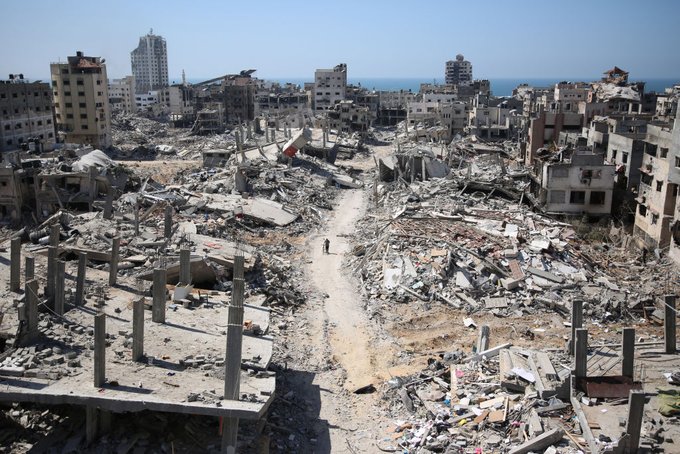Aerial image of Al-Shifa Hospital, Gaza. Photo: AFP via Getty Images
All states providing arms to Israel – directly or indirectly – must suspend arms transfers in response to systematic violations of international humanitarian law in Gaza and across the occupied Palestinian territories. Israel’s obstruction of humanitarian assistance into Gaza is unlawful and is causing unprecedented levels of catastrophic hunger, with famine in northern Gaza now imminent.
Use of this leverage is also imperative to deter a calamitous ground assault in Rafah, and signal that the disproportionate approach taken by Israel is not supported by its allies. In this regard, the Elders welcome the recent decision by the Government of Canada to suspend future arms sales to Israel.
As Israel’s closest ally and its largest provider of arms, the United States of America must lead the way. National Security Memorandum 20 issued in February was an important development, but we are deeply concerned that the Biden administration continues to approve arms transfers, appearing to accept Israel’s assurances on compliance with its legal obligations as credible, despite overwhelming evidence to the contrary.
Countries providing arms to Israel cannot legitimately claim that violations of international humanitarian law are not taking place, or that they supplied arms without this knowledge. The provisional measures ordered by the International Court of Justice on 26 January and 28 March should be a wake-up call. But Israel continues to act with impunity, and the scale of human suffering in Gaza continues to increase. Those providing arms are complicit, and need to be held accountable.
We also condemn the continued holding of hostages by Hamas, and its indiscriminate attacks on Israel. These are ongoing and systematic violations of international humanitarian law which contribute to the cycle of insecurity and violence. Iran in particular must use its influence to compel Hamas and other Palestinian armed groups to end such violations and immediately release all hostages, and to help de-escalate tensions across the region.
The wilful disregard by Israel and Hamas for the agreed norms that govern the conduct of war has wider consequences for the international rule of law. The Elders believe it is critical that the International Criminal Court accelerate its investigation. States parties to the ICC must provide the financial and political support needed to fully resource the Court’s global work, regardless of geo-political affiliation with those under investigation.
More broadly, all those with influence on the parties should back diplomacy with action, by using the full range of political, legal and financial levers at their disposal. This includes targeted sanctions to address state-sponsored settler violence and settlement expansion in the West Bank, building on the commendable steps already taken by the Biden administration. The EU’s Association Agreement with Israel, and the financial and political leverage of Arab states, should also be brought to bear to help compel a change of course in the region.
Nearly six months after the shocking attacks of 7 October, the Elders reiterate their call for an immediate ceasefire, and the full implementation of all relevant Security Council Resolutions. To suggest that such resolutions are non-binding is irresponsible, and further weakens an already ineffective Council. All member states are required to carry out the decisions of the Security Council, in line with Article 25 of the UN Charter.
The Elders further reiterate their call for an inclusive coalition for peace that can lay out a political pathway to end Israel’s decades-long occupation and permanently resolve the Israeli-Palestinian conflict.
This is the only way to guarantee peace, security and human rights for Palestinians and Israelis alike.
ENDS
Mary Robinson, former President of Ireland and Chair of The Elders
Ban Ki-moon, former UN Secretary-General and Deputy Chair of The Elders
Graça Machel, Founder of the Graça Machel Trust, Co-founder and Deputy Chair of The Elders
Gro Harlem Brundtland, former Prime Minister of Norway and former Director-General of the WHO
Helen Clark, former Prime Minister of New Zealand and former head of the UN Development Programme
Elbegdorj Tsakhia, former President and Prime Minister of Mongolia
Zeid Ra’ad Al Hussein, former UN High Commissioner for Human Rights
Hina Jilani, Advocate of the Supreme Court of Pakistan and co-chair of the Taskforce on Justice
Denis Mukwege, physician and human rights advocate, Nobel Peace Laureate
Ellen Johnson Sirleaf, former President of Liberia and Nobel Peace Laureate
Juan Manuel Santos, former President of Colombia and Nobel Peace Laureate
Ernesto Zedillo, former President of Mexico
